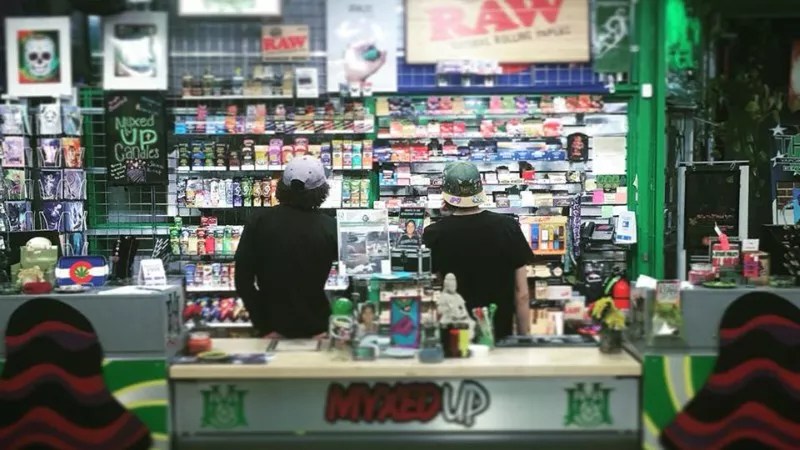

Audio By Carbonatix
Hours after Denver Environmental Health announced a ban on the sale of kratom for human consumption in the city late last year, DEH representatives allegedly stormed into a local business selling the herbal substance, which has gained popularity for its pain-relieving effects, and ordered stock valued in the thousands of dollars to be destroyed on the spot. A lawyer for the shop managed to stop that from happening, and he’s now preparing for a February 8 appeal hearing over what went down.
“This is a matter of fundamental fairness for a business and citizens who have complied with the law,” says attorney Michael Gross, who represents Myxed Up Creations; the mini-chain includes a Denver branch at 5800 East Colfax Avenue, as well as affiliates in Aurora, Colorado Springs and Pueblo. “And it’s an overreach by the government. This was essentially a commando raid.”
As we’ve reported, kratom has not been approved by the U.S. Food and Drug Administration, and in August 2016, the federal Drug Enforcement Administration took steps to reclassify it as a Schedule I narcotic before reversing course earlier in 2017. The change in approach was undoubtedly influenced by public backlash epitomized by a White House petition decrying the DEA proposal that attracted more than 140,000 signatures and a letter sent to acting DEA head Chuck Rosenberg that was signed by a group of 51 U.S. senators and representatives.
Nonetheless, the feds have continued to view kratom consumption as dangerous, attributing fifteen deaths between 2014 and 2016 to its use – though fourteen of those people had other drugs or illegal substances in their system. Last November 14, the U.S. Food and Drug Administration issued a public-health advisory warning individuals not to consume kratom, and six days later, on the morning of the 20th, Denver Environmental Health took things a step further.
The agency didn’t prohibit all sales of kratom, but retailers that wish to peddle it for non-consumptive purposes were told that they must affix a consumer advisory “in large font…easily readable to all purchasers” that states, “This product is not intended for human consumption. Consuming kratom products may pose a risk, including death, to consumers and has addictive potential. Increased risk of injury or death may be posed by consuming with alcohol and other drugs.” Moreover, DEH forbade sellers to give consumers advice about dosage or consumption.
At that point, Myxed Up entered the story.
“Inspectors from Denver Environmental Health showed up at the Colfax store at about noon on the 20th,” Gross notes, “and they started inspecting my client’s business. The shop had a small amount of consumable kratom in capsule form by the front-counter area, and they said, ‘You can’t sell this.'”
The inspectors didn’t stop there. “One of them asked, ‘May I use the bathroom?'” Gross continues. “The client’s employee, being a nice person, said, ‘Sure.’ So the inspector went into the back, which wasn’t a public area. The warehouse was fairly close to that, and he saw some kratom and immediately went over and seized it, too. And they wanted to destroy it on the spot by pouring bleach on it.”
The value of the consumable kratom – not counting non-consumable product, which the inspectors differentiated – was approximately $3,000, Gross points out. As such, his client objected to the destruction order: “He said, ‘No, we won’t let you do that.’ So the inspectors gave them a cease-and-desist order about sales and said, ‘We’re coming back on Wednesday to destroy it.'”
Gross, who had spent the day at court in Colorado Springs, returned to his office late that afternoon to discover “all hell was breaking loose. They wanted to destroy everything the Wednesday before Thanksgiving, which, as you can understand, is a very busy time for a retail business. So we filed an appeal with the department.”
A hearing in the matter originally scheduled for December was postponed until February 8, when Gross is scheduled to have only a small amount of time to make his case. “They told me I’ll get fifteen minutes,” he says.
Even if Gross is granted a longer session (“I plan to ask for an hour,” he says), he knows he won’t be able to present a wide-ranging argument against the ban itself. Instead, he’s likely to focus “on the lack of due process. They wanted to destroy the kratom the afternoon they issued the order, without any prior notice. And as far as I can tell, it’s legal in every other jurisdiction in Colorado. Instead of destroying it, they should let them move it down the street to their store in Aurora, or to Colorado Springs or Pueblo.”
This time around, Gross is hopeful that cooler heads will prevail. After all, he says, Denver officials have been cooperative in working with Myxed Up to relabel the non-consumable kratom it has on hand. But he’s still confused by the way the original incident was handled.
“This isn’t a synthetic designer drug,” he stresses. “This is a natural product – and I’ll bet cocaine and opium are treated with more respect. If inspectors or police find that, they take it into evidence. They don’t destroy it on the spot – which is what they wanted to do with my client’s kratom.”